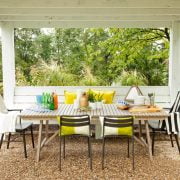There are many ways you can live a more sustainable lifestyle. With a few eco-friendly habits in place, you can reduce your carbon footprint, help the environment, get your own garden, and even save yourself money.
Convert To Solar Power
Solar panels won’t produce any harmful emissions that destroy the environment as traditional fossil fuel technologies would. Solar panels are used to capture the sun’s energy and convert it into heat or electricity to power your home. Review your energy usage to determine how many solar panels you will need for your house. A solar energy company can help evaluate your needs and provide a quote for the total cost of installation. Compare the price per watt and price of installation between different solar energy companies. Consider the price as well as their reputation and attention to detail when selecting a company you trust. Once you install your solar panels, you may be eligible for many different financial incentives. Ask about federal tax credits or any other incentives in your area that may vary by state. You will get the most from your solar panels if your home is in an area that receives a sufficient amount of sunlight all year long.
Start a Compost Pile
Composting can reduce your waste, enrich your soil, and help you live a more sustainable life. It can even help prevent soil erosion and help with stormwater management. Composting requires carbon, nitrogen, oxygen, microorganisms, and moisture to break down organic matter and produce a nutrient-rich fertilizer. Clear a space in your yard to set up your compost pile. Use a composting bin or tumbler to begin building your compost with a base layer of twigs and straw. This will help provide drainage for your compost to decompose and break down more effectively. You can then add layers of materials, alternating between green and brown materials. Green materials are nitrogen-based waste including food scraps, coffee grounds, leaves, and grass. Brown materials include carbon-rich materials like wood, dry leaves, branches, sawdust, or shredded newspaper. Add to it by storing your food scraps in an airtight container that makes it easy for you to bring out to your compost pile every week. Keep the compost pile moist and consider adding nitrogen fertilizer to kickstart the breakdown process. Every few weeks, you will need to turn the compost pile to help the process along. Your compost pile can take several months to produce usable compost.
Grow Your Ingredients
You may not realize how much energy is used or how much waste is produced when you go out to the store and buy groceries. Conserve resources and practice organic gardening by growing your food at home. Determine what plants you can grow in your climate zone and choose an ideal location to make your garden bed. Once your soil is tested and prepped, you can plant your seeds. If you don’t have room for a garden outside, you can use planters on your window to grow small plants and herbs. Adding plants around your home can help add natural color and texture to your home décor. Having plants inside will even help produce more oxygen and purify the air.
These are just a few different ways you can make your home eco-friendlier and embrace a more sustainable lifestyle.














Comments